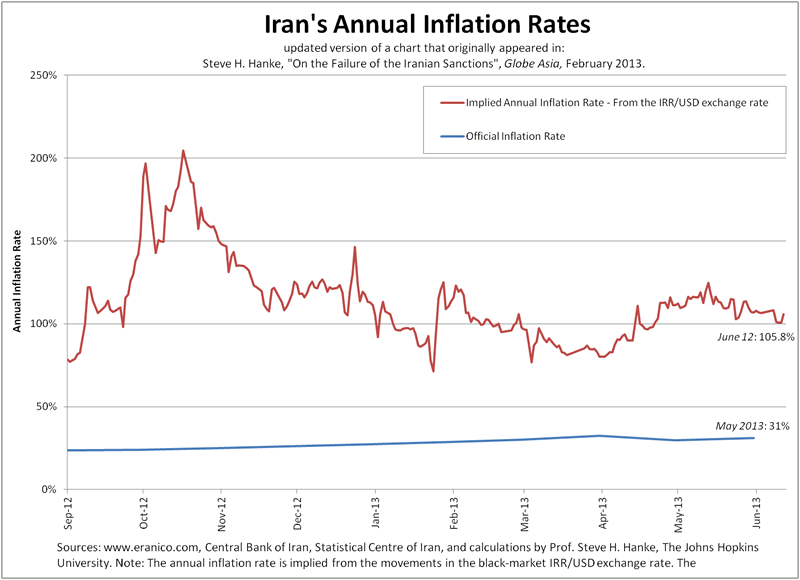Iran’s Inflation Bogey
Economics / Inflation Jun 13, 2013 - 03:57 PM GMTBy: Steve_H_Hanke
 With Friday’s Iranian Presidential election fast approaching, there has been a cascade of reportage in the popular press about that opaque country. When it comes to economic data, Iran has resorted to lying, spinning and concealment – in part, because of its mores and history, and more recently, the ever-tightening international sanctions regime. In short, deception has been the order of the day.
With Friday’s Iranian Presidential election fast approaching, there has been a cascade of reportage in the popular press about that opaque country. When it comes to economic data, Iran has resorted to lying, spinning and concealment – in part, because of its mores and history, and more recently, the ever-tightening international sanctions regime. In short, deception has been the order of the day.
The most egregious example of this deception concerns one of Iran’s most pressing economic problems – rampant inflation. Indeed, while the rest of the world watched Iran’s economy briefly slip into hyperinflation in October of 2012, the Statistical Centre of Iran and Iran’s central bank both defiantly reported only mild upticks in inflation.
It is, therefore, rather surprising that the major international news outlets have continued to report the official inflation data without so much as questioning their accuracy. Even today, with official data putting Iran’s annual inflation rate at a mere 31 percent, respectable news sources faithfully report these bogus data as fact.
As I have documented, regimes in countries undergoing severe inflation have a long history of hiding the true extent of their inflationary woes. In many cases, such as the recent hyperinflation episodes in Zimbabwe and North Korea, the regimes resort to underreporting or simply fabricating statistics to hide their economic problems. Often, they stop reporting economic data all together; or, when they do report economic statistics, they do so with such a lag that the reported data are of limited use by the time they see the light of day.
Iran has followed this course – failing to report important economic data in a timely and replicable manner. Those data that are reported by tend to possess what I’ve described as an “Alice in Wonderland” quality. In light of this, it is fair to suggest that any official data on Iran’s inflation be taken with a grain of salt.
So, how can this problem be overcome? At the heart of the solution is the exchange rate. If free-market data (usually black-market data) are available, the inflation rate can be estimated. The principle of purchasing power parity (PPP), which links changes in exchange rates and changes in prices, allows for a reliable estimate. Indeed, PPP simply states that the exchange rate between two countries is equal to the rates of their relative price levels. Accordingly, if we can obtain data on free-market exchange rates, we can make a reliable estimate of the inflation rate.
In short, changes in the exchange rate will yield a reliable implied inflation rate, particularly in cases of extreme inflation. So, to calculate the inflation rate in Iran, a rather straightforward application of standard, time-tested economic theory is all that is required.
Using this methodology, it is possible to estimate a reliable figure for Iran’s annual inflation rate. At present the black-market IRR/USD exchange rate sits at 36,450. Using this figure, and a time series of black-market exchange rate data that I have collected over the past year from currency traders in the bazaars of Tehran, I estimate that Iran’s current annual inflation rate is 105.8 percent – a rate almost three and a half times the official annual inflation figure (see the accompanying chart).

By Steve H. Hanke
www.cato.org/people/hanke.html
Steve H. Hanke is a Professor of Applied Economics and Co-Director of the Institute for Applied Economics, Global Health, and the Study of Business Enterprise at The Johns Hopkins University in Baltimore. Prof. Hanke is also a Senior Fellow at the Cato Institute in Washington, D.C.; a Distinguished Professor at the Universitas Pelita Harapan in Jakarta, Indonesia; a Senior Advisor at the Renmin University of China’s International Monetary Research Institute in Beijing; a Special Counselor to the Center for Financial Stability in New York; a member of the National Bank of Kuwait’s International Advisory Board (chaired by Sir John Major); a member of the Financial Advisory Council of the United Arab Emirates; and a contributing editor at Globe Asia Magazine.
Copyright © 2013 Steve H. Hanke - All Rights Reserved
Disclaimer: The above is a matter of opinion provided for general information purposes only and is not intended as investment advice. Information and analysis above are derived from sources and utilising methods believed to be reliable, but we cannot accept responsibility for any losses you may incur as a result of this analysis. Individuals should consult with their personal financial advisors.
Steve H. Hanke Archive |
© 2005-2022 http://www.MarketOracle.co.uk - The Market Oracle is a FREE Daily Financial Markets Analysis & Forecasting online publication.



